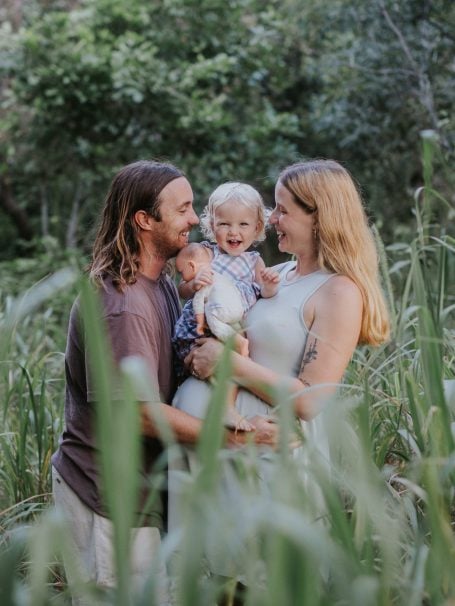Can you explain the biological changes in a baby’s sleep patterns from newborn until toddlerhood?
A baby’s sleep patterns undergo significant changes from newborn to toddlerhood as their brain and body develop. Newborns sleep around 16-18 hours a day in short, fragmented stretches, mainly due to hunger and discomfort, with sleep cycles lasting about 50 minutes. At this stage, they spend most of their sleep time in REM sleep (active sleep), which is crucial for brain development. Newborns don’t have a circadian rhythm yet, so their sleep-wake cycles are not regulated by day and night.
As babies grow into infants (2-12 months), their sleep becomes more consolidated, with longer nighttime stretches, (about 5-6 hours) and 2-3 naps during the day. Their sleep cycles lengthen, and they start developing a circadian rhythm, making their sleep patterns more predictable which is what we want! By the time they reach toddlerhood (12-36 months), they typically sleep 12-14 hours a day, with one nap. Sleep cycles continue to lengthen to about 90-120 minutes, and they spend more time in deeper, restorative non-REM sleep. Their circadian rhythm is fully developed, and they can sleep through the night with regular bedtimes, supporting cognitive and physical development.
There is a lot of societal pressure for parents to get their infants to sleep through the night. Is this a realistic expectation?
Yes the pressure is real, but it’s not a realistic expectation for all, especially in the early months. Newborns have small stomachs and need frequent feeds, and their circadian rhythms aren’t fully developed, so they can’t differentiate between day and night. It’s normal for babies to wake up multiple times during the night in the first few months. By around 6 months, many babies do start to sleep longer stretches, but it’s still common for them to wake occasionally due to hunger or discomfort. Instead of focusing on getting your baby to sleep through the night straight away, it’s important to focus on creating a calm, soothing, consistent sleep environment and establishing healthy sleep habits. Every baby’s sleep pattern evolves at their own pace, so patience and consistency are key.
What role does temperament play in sleep, and why do some babies seem to sleep easily while others struggle?
Temperament significantly influences a baby’s sleep patterns, as each baby has a unique personality. Some are relaxed and adaptable, making it easier for them to settle into sleep routines, while others may be sensitive or reactive, making sleep more challenging. Sensitive babies might struggle to settle down, wake more often at night, or have difficulty adapting to new sleep environments. Factors such as sensitivity to stimuli, emotional regulation, and adaptability also play a role. While temperament is important, other variables like developmental stage, health, sleep environment, and parenting approaches also affect a baby’s sleep success.
How do you help parents set healthy and realistic expectations based on their child’s stage, temperament, and unique situation?
I help parents manage expectations by assessing their baby’s developmental stage, temperament, and unique needs. Understanding that every baby’s sleep journey is different, I tailor strategies to match their unique temperament, whether they’re more adaptable or sensitive. I develop a clear, results-driven plan in partnership with parents, and focus on teaching consistency, as this is how babies learn best. With the right approach and when parents are ready, progress is both efficient and long-lasting.
Normalising the sleep challenges that come with each stage and temperament helps parents feel more at ease, knowing their child’s sleep will improve over time.
When creating a support plan, how do you take into account factors like feeding, reflux, and high-needs babies?
We take a holistic approach to sleep, considering factors like feeding, reflux, and high-needs temperament. A baby’s specific needs, including their weight and age, are essential for creating a feeding plan that ensures they’re full before naps and bedtime. Reflux management is crucial if the baby is in pain, and they should have clearance from their GP. For high-needs babies, a flexible approach is necessary, focusing on comfort and soothing techniques like longer bedtime routines or increased physical closeness. Tailoring the support plan to individual needs helps parents feel equipped and confident, with realistic expectations and gradual adjustments.
Can you debunk a common myth about infant sleep that often causes parents unnecessary stress?
A common myth that leads to unnecessary stress for parents is the belief that “all babies should sleep through the night by 3-4 months without any help.” The truth is that not all babies are developmentally ready to sleep through the night at that age, and every baby’s sleep patterns are unique. Some babies may continue to wake for feeds, even beyond 6 months. Expecting a baby to sleep through the night without considering their temperament or specific needs can leave parents feeling overwhelmed, frustrated and deflated.
Instead of pushing for an unrealistic expectation, seeking support from an infant sleep expert can provide personalised guidance and practical strategies tailored to the baby’s age, temperament, and developmental stage. An infant sleep expert can help parents navigate sleep challenges, create a healthy sleep routine, and manage nighttime awakenings in a way that feels right for both the baby and the family, setting all up for sleep success!
What are the key elements of a healthy sleep environment for a newborn or infant?
A healthy sleep environment for a newborn/infant should prioritise safety, comfort and consistency. Babies should be placed on their back in a firm cot or bassinet, free of pillows, blankets, and soft toys to reduce the risk of SIDS. Swaddling is key in the early months, as it mimics the feeling and security of the womb and prevents the startle reflex, promoting longer, deeper sleep. Keeping the room at a comfortable temperature (18-22°C) and ensuring it’s dark to help regulate their circadian rhythm. White noise is beneficial for recreating what babies her in the womb, creating a calming atmosphere. It also acts as a positive sleep cue and drowns out environmental noises. A dummy is optional, but it can provide extra comfort and reduce the risk of SIDS when used safely. Consistency is key when establishing healthy sleep habits. Babies thrive on routine and predictability, it’s how they learn and feel secure and settled.
How can partners and support networks play a role in improving sleep for both mama and baby?
Lean on your partner and share responsibilities, like nighttime feedings or settling the baby, partners can help take the pressure off, giving you the chance to rest and recover. Dads often wonder what they can do to help in the early months, and learning to swaddle is a fantastic way to get involved. Not only does it allow for bonding with the baby, but it also gives mum some relief, as dad can settle the baby once fed.
Having a supportive network of family or friends can also make a big difference, whether it’s cooking a meal, looking after the baby for a short period so mum can nap, or simply giving mum some time to herself. When everyone is well-rested, it creates a calmer environment for the whole family.
What would be the key considerations/questions for a family to ask a sleep support consultant before they work together to ensure they are a good match?
What is your approach to sleep training? Understanding the consultant’s philosophy on sleep (gentle vs. more structured methods) helps determine if their approach aligns with your family’s values and preferences.
What qualifications and experience do you have? It’s important to know the consultant’s training, certifications, and experience working with babies of different ages, as well as their familiarity with specific sleep challenges.
What kind of support will I receive during the process? Ask about the level of ongoing support, including follow-up calls, text support, or personalised check-ins to ensure you’re not alone during the sleep training journey.
How do you tailor your advice to individual families? Every baby is unique, so it’s important that the consultant offers a personalised plan that takes into account your baby’s temperament, your family’s routine, and your specific needs.
What is your success rate, and can you share any testimonials? Inquire about past clients’ experiences and any success stories, which will help you gauge the consultant’s ability to deliver results.
How do you handle setbacks or challenges? Sleep training isn’t always a straight path, so it’s important to understand how the consultant will help troubleshoot and adjust the plan if things don’t go as expected.
What is your availability? Make sure the consultant’s availability fits within your schedule, especially if you need urgent support during a tough night or week.
How do you help parents shift their mindset from “fixing” sleep problems to understanding and supporting their baby’s sleep journey?
Shifting from a “fixing” mindset to supporting your baby’s sleep journey is key to creating a healthier routine that sets your baby up with good sleep habits for life. I help parents see sleep challenges as part of their baby’s natural development, not something that needs to be “fixed.” Babies go through different sleep phases, and it’s about being consistent, patient, and supportive as they learn to self-soothe and sleep independently. This mindset shift reduces stress, as parents understand that sleep struggles are temporary. I work with parents to develop a plan that works for their baby’s age and pace, empowering them to trust the process and feel confident along the way.
What’s one thing you wish more parents understood about infant sleep that would help them feel more confident and less pressured?
Self-settling is a natural learnt behaviour and establishing healthy sleep habits from birth will set your baby up for sleep success and often negate the need to sleep train.
If a parent is struggling with sleep but also wants to be gentle and responsive, what’s the first step they can take today?
Create a calm, consistent bedtime routine that signals to your baby it’s time to sleep. Something simple like dimming the lights, using a soothing sound like white noise, and swaddling your baby can help set the tone. It’s also important to be responsive to your baby’s cues, offering comfort when needed and allowing them small opportunities to self-soothe when ready. This balance of being gentle while encouraging independence can make a big difference and helps parents feel more confident in their approach. Start with small, manageable changes and trust the process.
Find more information on how Sarah from Swoop Baby can help support your family here





























